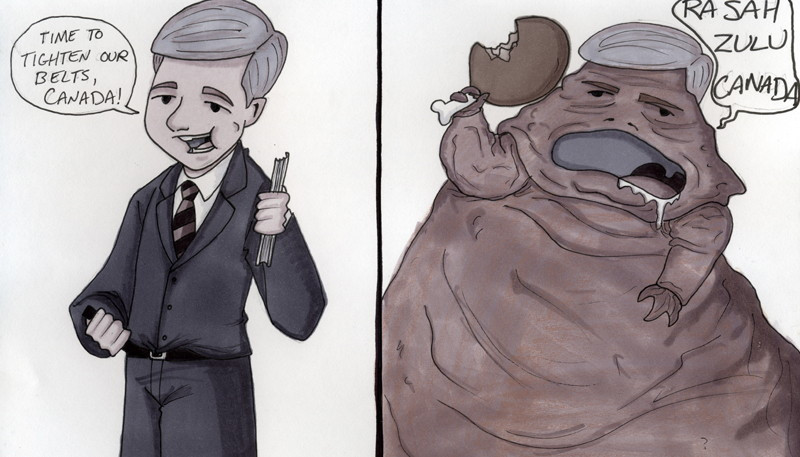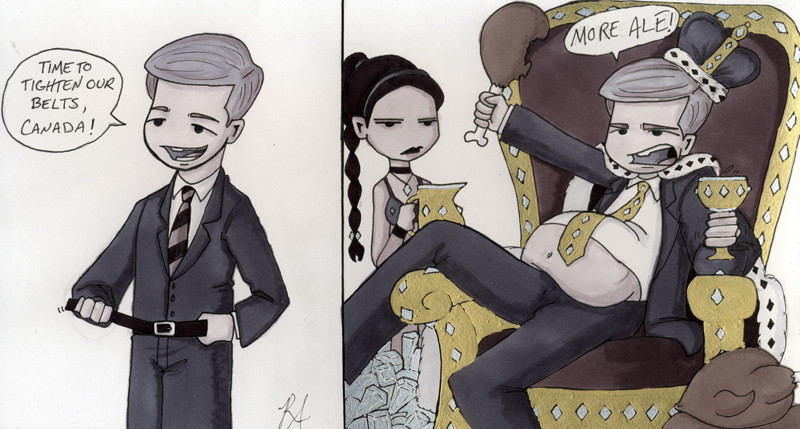Cutting structural deficit will be hard without cutting out neoliberal ideology
When Parliamentary Budget Officer Kevin Page released his Fiscal Sustainability Report in January, explaining among other things that the debt will explode to 200 per cent of Canada’s Gross Domestic Product by 2050 if current fiscal policy is maintained, you’d think that the media or the federal opposition would pay attention to it for more than a month.
So far, the Conservative government – that ran on a platform on accountability, transparency and a balanced budget – has escaped public pressure on its self-created structural deficit.
A structural deficit is defined as “the portion of a country’s budget deficit that is not the result of changes in the economic cycle. The structural deficit will exist even when the economy is at the peak of the cycle.”
The current deficit, varying by billions of dollars depending on which source you read, is somewhere around $50 billion.
It is odd that it hasn’t garnered more media attention, because both the Conservative and Liberal parties stress the importance of a balanced budget as an important function of government. They also use neoliberal propaganda to convince the public that a government deficit is an evil that needs to be erased in order for an economy to function optimally.
While this line of thinking holds some truth to it, it is also used as an excuse to make ideological spending cuts on social services, welfare and bureaucracy. This strategy was implemented by the Liberals after the 1993 federal election and continues to this day under the Conservatives.
Canadian voter behaviour tends to show that promises to slay the deficit are an effective vote-winner. If we assume that the Conservative party is correct and that a balanced budget should be the obsessive task of government, we should expect a credible plan to get us there.
While the government temporarily adopted Keynesian strategies of involving government heavily in the economy with its stimulus package, they will be hard pressed to pay off the debt by falling back on neoliberalism, which they seem inclined to do.
The first reason for this is that Canada has a shrinking tax base; the baby boomers are retiring and the workforce size isn’t increasing as fast to replace them.
While tax and social spending cuts were somewhat balanced by increased consumer spending by baby boomers in the 1990s, as well as a safeguarded a budget surplus, it has expired as a economic crutch during this economic crisis as these “consumers” retire.
People are living longer, having fewer children and immigration is still too restrictive to make up for the first two problems. An aging population will continue to result in more spending on health care and pensions, while less government revenue will come from income tax.
This is the primary reason in Page’s report for such a ballooning structural deficit in the coming decades. Meanwhile, the middle class is being eroded while the lower class is expanding, making more people dependent on social programs.
Even if Canada wanted to follow a neoliberal agenda, Prime Minister Stephen Harper and his white-and-old finance club could have made Canada’s deficit a lot less if they hadn’t gone crazy with the tax cuts.
They have cut the GST twice since they were elected in 2006. For each percentage that the GST is cut, the government loses out on $5 billion of revenue annually.
But a larger problem has arisen from corporate tax cuts, which since 2006 alone have reduced government revenue by $60 billion. That’s enough to pay off the deficit alone. Corporations only pay 15 per cent of the tax revenue in Canada, while individuals carry 61 per cent burden. There’s a lot of lost revenue out there that’s being ignored.
Unfortunately, neoliberals think that by cutting corporate tax rates industry will expand, resulting in economic growth. They also tend to think that an expanded economy will magically cut the deficit through existing consumption and income tax on that growth.
The welfare system in Canada has already been hollowed out to a minimum and our health care system receives short of adequate funding. Canada needs to choose what it wants because it can’t have a zero deficit and stay with neoliberalism.
Somehow voters will have to realize this without media or the opposition putting pressure on neoliberal dogma.
Matt Austman is a politics student at the University of Winnipeg
Published in Volume 65, Number 4 of The Uniter (September 23, 2010)








